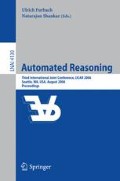Abstract
Inspired by the Curry-Howard correspondence, we study normalisation procedures in the depth-bounded intuitionistic sequent calculus of Hudelmaier (1988) for the implicational case, thus strengthening existing approaches to Cut-admissibility. We decorate proofs with terms and introduce various term-reduction systems representing proof transformations. In contrast to previous papers which gave different arguments for Cut-admissibility suggesting weakly normalising procedures for Cut-elimination, our main reduction system and all its variations are strongly normalising, with the variations corresponding to different optimisations, some of them with good properties such as confluence.
Access this chapter
Tax calculation will be finalised at checkout
Purchases are for personal use only
Preview
Unable to display preview. Download preview PDF.
References
Baader, F., Nipkow, T.: Term Rewriting and All That. Cambridge University Press, Cambridge (1998)
Dyckhoff, R., Kesner, D., Lengrand, S.: Strong cut-elimination systems for Hudelmaier’s depth-bounded sequent calculus for implicational logic(2006), Full version available at http://www.pps.jussieu.fr/~lengrand/Work/Papers.html
Dyckhoff, R., Lengrand, S.: LJQ, a strongly focused calculus for intuitionistic logic. In: Beckmann, A., Berger, U., Löwe, B., Tucker, J.V. (eds.) CiE 2006. LNCS, vol. 3988, Springer, Heidelberg (2006)
Dershowitz, N., Manna, Z.: Proving termination with multiset orderings. Communications of the ACM 22(8), 465–476 (1979)
Dyckhoff, R., Negri, S.: Admissibility of structural rules for contraction-free systems of intuitionistic logic. The Journal of Symbolic Logic 65(4), 1499–1518 (2000)
Dyckhoff, R.: Contraction-free sequent calculi for intuitionistic logic. The Journal of Symbolic Logic 57(3), 795–807 (1992)
Hudelmaier, J.: Bounds for Cut Elimination in Intuitionistic Logic. PhD thesis, Universität Tübingen (1989)
Hudelmaier, J.: Bounds on cut-elimination in intuitionistic propositional logic. Archive for Mathematical Logic 31, 331–354 (1992)
Kamin, S., Lévy, J.-J.: Attempts for generalizing the recursive path orderings. Handwritten paper, University of Illinois (1980)
Lincoln, P., Scedrov, A., Shankar, N.: Linearizing intuitionistic implication. In: Proc. of the Sixth Annual IEEE Symposium on Logic in Computer Science, Amsterdam, The Netherlands, pp. 51–62 (1991)
Matthes, R.: Contraction-aware λ-calculus, Seminar at Oberwolfach (2002)
O’Donnell, M.J.: Computing in Systems Described by Equations. LNCS, vol. 58. Springer, Heidelberg (1977)
Otten, J., Raths, T., Kreitz, C.: The ILTP Library. In: Beckert, B. (ed.) TABLEAUX 2005. LNCS (LNAI), vol. 3702, pp. 333–337. Springer, Heidelberg (2005)
Pitts, A.M.: On an interpretation of second order quantification in first-order intuitionistic propositional logic. Journal of Symbolic Logic 57, 33–52 (1992)
Pitts, A.M.: Nominal logic, a first order theory of names and binding. Information and Computation 186, 165–193 (2003)
Troelstra, A.S., Schwichtenberg, H.: Basic Proof Theory. Cambridge University Press, Cambridge (2000)
Vestergaard, R.: Revisiting Kreisel: A computational anomaly in the Troelstra-Schwichtenberg g3i system (March 1999), available at http://www.cee.hw.ac.uk/homedirjrvest/
Vorob’ev, N.N.: A new algorithm for derivability in the constructive propositional calculus. American Mathematical Society Translations 94(2), 37–71 (1970)
van Oostrom, V., van Raamsdonk, F.: Weak orthogonality implies confluence: the higher-order case. In: Matiyasevich, Y.V., Nerode, A. (eds.) LFCS 1994. LNCS, vol. 813, pp. 379–392. Springer, Heidelberg (1994)
Author information
Authors and Affiliations
Editor information
Editors and Affiliations
Rights and permissions
Copyright information
© 2006 Springer-Verlag Berlin Heidelberg
About this paper
Cite this paper
Dyckhoff, R., Kesner, D., Lengrand, S. (2006). Strong Cut-Elimination Systems for Hudelmaier’s Depth-Bounded Sequent Calculus for Implicational Logic. In: Furbach, U., Shankar, N. (eds) Automated Reasoning. IJCAR 2006. Lecture Notes in Computer Science(), vol 4130. Springer, Berlin, Heidelberg. https://doi.org/10.1007/11814771_31
Download citation
DOI: https://doi.org/10.1007/11814771_31
Publisher Name: Springer, Berlin, Heidelberg
Print ISBN: 978-3-540-37187-8
Online ISBN: 978-3-540-37188-5
eBook Packages: Computer ScienceComputer Science (R0)

